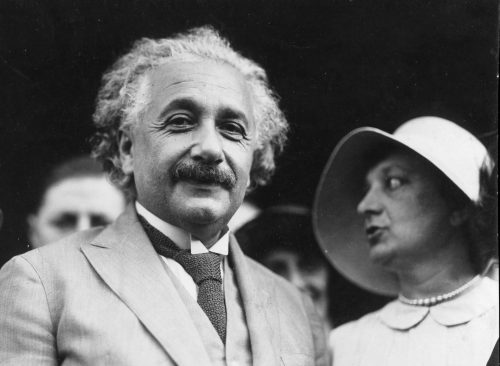Albert Einstein has a lot of famous quotes, most of which you probably grew up staring at in a classroom poster:
Insanity: doing the same thing over and over again and expecting different results.
Life is like riding a bicycle. To keep your balance you must keep moving.
Try not to become a man of success, but rather try to become a man of value.
But there’s one crucial piece of wisdom–the secret to happiness–that he hadn’t shared… until it was recently discovered among notes written to a courier in 1922.
According to multiple reports, the physicist was staying at the Imperial Hotel in Tokyo while on a lecture tour of Japan. By then, the 43-year-old was already world famous and respect in his field, having just one the Nobel Prize in Physics the year before. It appears even Nobel Prize winners can make simple mistakes, however, and the scientist found himself without any tip to give his hotel bellboy. So, instead, two notes, on which he wrote the keys to living a happy and unfulfilling life.
“Maybe if you’re lucky those notes will become much more valuable than just a regular tip,” he reportedly told him.
He was right, as well, since, on Tuesday, the note sold for a whopping $1.3 million at the Winner’s auction house in Jerusalem, Israel, to a European who wished to remain anonymous. This far exceeded the estimated price, which was only $5,000-$8,000, the auction house reported.
So, what did the notes say?
One held one of his oft-quoted maxims: Where there’s a will, there’s a way. This one sold for only $240,ooo, according to the auction house.
But the other one said something that had previously been lost to the annals of history: A quiet and modest life brings more joy than a pursuit of success bound with constant unrest.
OK, so, yes, maybe it’s not really that much better than what you would get from a fortune cookie, but it’s kind of an interesting thing to hear from a man who became a groundbreaking historical figure due to his tireless pursuit of science. Was Einstein, in a way, indicating that he wished he had lives a simpler, less ambitious life?
“What we’re doing here is painting the portrait of Einstein – the man, the scientist, his effect on the world – through his writings,” Roni Grosz, an Einstein archivist at Jerusalem’s Hebrew University, said of the significance of the memo. “This is a stone in the mosaic.”












